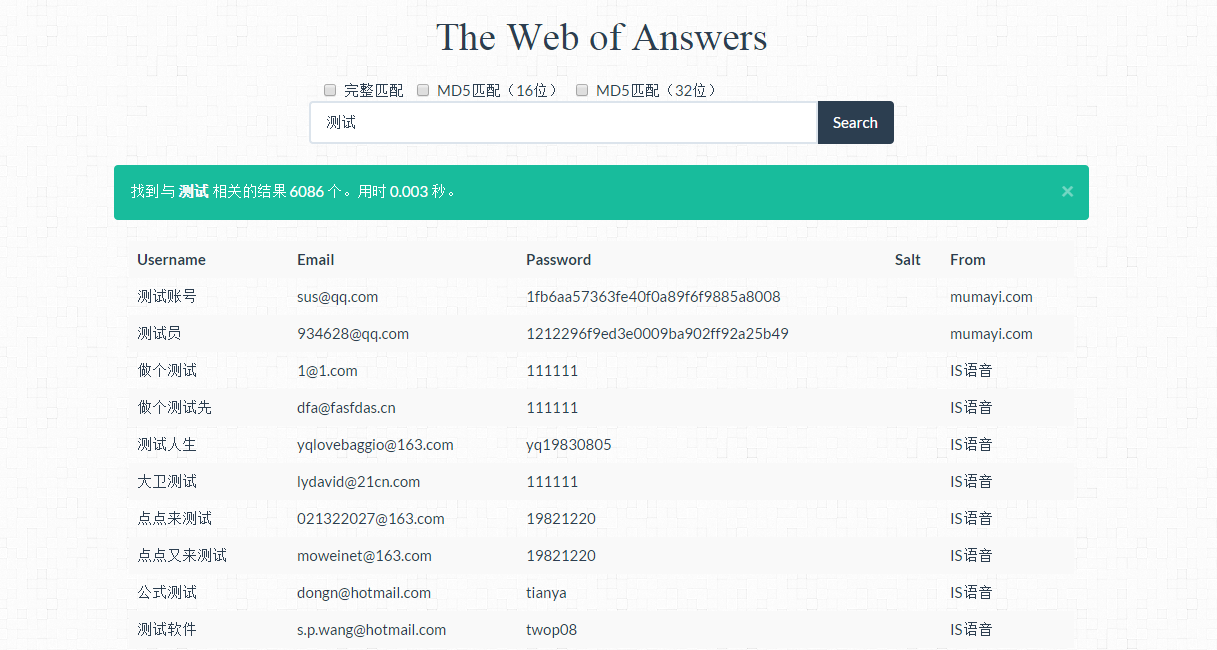(本来只是随手记录没想到成了博客里最受欢迎的文章… 不过看看这个问题里排名第一的回答,这才叫大数据,不知道比我们高到哪里去了 ╮(╯_╰)╭)
之前下载过一些裤子,但是没怎么用过……一来是维护自己的社工库费时费力,二来在线的社工库也基本够用了。
后来导了一个10多G的裤子进 Mysql ,单表,数据有近2亿条,即使加了索引查起来也慢的不行,有时候还没有用暴力搜索文本内容的小工具查的快。于是查了下资料,试了试用 Coreseek 做全文索引,速度不错(毫秒级)。
从官网下载最新版(4.1)的 Coreseek ,解压到某个目录,打开 etc 目录,里面有个 csft_mysql.conf 配置示例文件,贴一下我的配置文件(命名为 sed.conf ):
#源定义
source sed
{
type = mysql
sql_host = localhost
sql_user = test
sql_pass = test
sql_db = sed
sql_port = 3306
sql_query_pre = SET NAMES utf8
sql_query = SELECT `id`, `username`, `password`, `email`, `salt`, `order` FROM md5_sgk #sql_query第一列id需为整数,username、password、email等作为字符串/文本字段,被全文索引
sql_attr_uint = id #从SQL读取到的值必须为整数
#sql_field_string = username
#sql_field_string = password
#sql_field_string = email
#sql_attr_timestamp = date_added #从SQL读取到的值必须为整数,作为时间属性
sql_query_info_pre = SET NAMES utf8 #命令行查询时,设置正确的字符集
sql_query_info = SELECT `id`, `username`, `password`, `email`, `salt`, `order` FROM md5_sgk WHERE id=$id #命令行查询时,从数据库读取原始数据信息
}
#index定义
index sed
{
source = sed #对应的source名称
path = E:/SQL_DATA/coreseek/var/data/sed #请修改为实际使用的绝对路径,例如:/usr/local/coreseek/var/...
docinfo = extern
mlock = 0
morphology = none
min_word_len = 1
ondisk_dict = 1 #索引不载入内存而是保存在硬盘上
html_strip = 0
#中文分词配置,详情请查看:http://www.coreseek.cn/products-install/coreseek_mmseg/
#charset_dictpath = /usr/local/mmseg3/etc/ #BSD、Linux环境下设置,/符号结尾
charset_dictpath = E:/SQL_DATA/coreseek/etc/ #Windows环境下设置,/符号结尾,最好给出绝对路径,例如:C:/usr/local/coreseek/etc/...
charset_type = zh_cn.utf-8
}
#全局index定义
indexer
{
mem_limit = 1024M
}
#searchd服务定义
searchd
{
listen = 9312
read_timeout = 5
max_children = 30
max_matches = 1000
seamless_rotate = 0
preopen_indexes = 0
unlink_old = 1
pid_file = E:/SQL_DATA/coreseek/var/log/searchd_mysql.pid #请修改为实际使用的绝对路径,例如:/usr/local/coreseek/var/...
log = E:/SQL_DATA/coreseek/var/log/searchd_mysql.log #请修改为实际使用的绝对路径,例如:/usr/local/coreseek/var/...
query_log = E:/SQL_DATA/coreseek/var/log/query_mysql.log #请修改为实际使用的绝对路径,例如:/usr/local/coreseek/var/...
binlog_path = #关闭binlog日志
}
具体的配置信息可以看看官方手册。
有些资料里使用了 sql_field_string,但是据测试很可能出现 too many string attributes (current index format allows up to 4 GB) 这个错误,不知是不是因为是32位程序的原因,所以最好不要用,或者可以试试64位的 Sphinx。
然后把 searchd 注册成服务 searchd --install --config ..\etc\sed.conf,以免每次使用都要在命令行窗口打开。
接着用 indexer -c ..\etc\sed.conf --all --rotate 建立全文索引。
如果有增量索引的还要合并索引(我测试的时候并没有做增量索引,可以参考这篇文章。)
索引建立完后试试能否正常搜索: search -c ..\etc\sed.conf adwin ,如果出现 search error: failed to open xxx.sph: No such file or directory 这个错误,可能原因有:
It seems that
a) the lock files were lost somehow, and
b) you ran indexer without --rotate switch.
Normally, searchd would create .spl lock files on startup (and kill them on shutdown),
and indexer would then refuse to reindex without --rotate switch.
indexers sends SIGHUP to searchd when completed (and it should print that out). searchd
then does the following:
1) waits for all children to exit
2) renames current index files to .old
3) renames .new index files to current
4) tries to load current index files
5) if something failed, it rollbacks current files from .old and new to .new
In your case I would start with double checking directory access rights, users which both
indexer and searchd run under, etc.
据我的经验一般把 data 目录下的文件名里多出来的.new去掉就好。
最后调用自带的 sphinxapi.php 即可,我直接用的 Ph4nt0m 的源码(界面用 Bootstrap 重写了下):
<?php
// 引用sphinxapi类
require "sphinxapi.php";
//关闭错误提示
error_reporting(E_ALL & ~E_NOTICE);
$num = 0;
if (!empty($_GET) && !empty($_GET['q'])) {
$Keywords = strip_tags(trim($_GET['q']));
if (!empty($_GET['m']) && 1 == $_GET['m']) {
$Keywords = substr(md5($Keywords), 8, 16);
}
if (!empty($_GET['m']) && 2 == $_GET['m']) {
$Keywords = md5($Keywords);
}
$cl = new SphinxClient();
// 返回结果设置
$cl->SetServer('127.0.0.1', 9312);
$cl->SetConnectTimeout(3);
$cl->SetArrayResult(true);
// 设置是否全文匹配
if (!empty($_GET) && !empty($_GET['f'])) {
$cl->SetMatchMode(SPH_MATCH_ALL);
} else {
$cl->SetMatchMode(SPH_MATCH_ANY);
}
if (!empty($_GET) && !empty($_GET['p'])) {
$p = !intval(trim($_GET['p'])) == 0 ? intval(trim($_GET['p'])) - 1 : 0;
$p = $p * 20;
// 我在sed.conf 设置了最大返回结果数1000。但是我在生成页码的时候最多生成20页,我想能满足大部分搜索需求了。
// 以下语句表示从P参数偏移开始每次返回20条。
$cl->setLimits($p, 20);
} else {
$cl->setLimits(0, 20);
}
$res = $cl->Query(".$Keywords.", "*");
@mysql_connect("localhost", "test", "test"); //数据库账号密码
mysql_select_db("sed"); //数据库库名名
if (is_array($res["matches"])) {
foreach ($res["matches"] as $docinfo) {
$ids = $ids . $docinfo[id] . ',';
}
$ids = rtrim($ids, ',');
$sql = "select * from md5_sgk where id in($ids)"; //注意修改表名
mysql_query("set names utf8");
$ret = mysql_query($sql);
$num = mysql_num_rows($ret);
}
}
?>
<!DOCTYPE html>
<html>
<head>
<title>The Web of Answers</title>
<meta charset="UTF-8">
<meta name="viewport" content="width=device-with,initial-scal=1">
<link href="css/bootstrap.min.css" rel="stylesheet">
<script src="js/jquery.js"></script>
<script src="js/bootstrap.min.js"></script>
<script>
function check(form){
if(form.q.value==""){
alert("Not null !");
form.q.focus();
return false;
}
}
</script>
<style>
h1 {
font-family: Times New Roman, Lucida Handwriting;
}
body {
background-image: url(img/bg.jpg);
}
</style>
</head>
<body>
<div class="container" id="container">
<div id="page-header">
<h1 class="text-center"> The Web of Answers </h1>
</div>
<div class="row">
<form action="" method="get" class="form-horizontal" role="form">
<div id="checkbox" class="col-md-6 col-md-offset-3">
<label class="checkbox-inline">
<input type="checkbox" id="full" name="f" value="1"> 完整匹配
</label>
<label class="checkbox-inline">
<input type="checkbox" id="md5_16" name="m" value="1">
MD5匹配(16位)
</label>
<label class="checkbox-inline">
<input type="checkbox" id="md5_32" name="m" value="2">
MD5匹配(32位)
</label>
</div>
<div class="input-group col-md-6 col-md-offset-3">
<input type="text" class="form-control" name="q" placeholder="请输入" value="<?php echo strip_tags(trim($_GET['q']));?>">
<div class="input-group-btn">
<button type="submit" class="btn btn-primary" onclick="check(form)">Search</button>
</div>
</div>
</form>
</div>
<br>
<?php
if (0 == !$num) {
echo "<div class=\"row\">
<div class=\"alert alert-success alert-dismissible col-md-10 col-md-offset-1\" role=\"alert\">
<button type=\"button\" class=\"close\" data-dismiss=\"alert\"><span aria-hidden=\"true\">×</span><span class=\"sr-only\">Close</span></button>
找到与<b> {$Keywords} </b>相关的结果 {$res[total_found]} 个。用时 {$res[time]} 秒。</div>";
echo "<div class=\"table-responsive col-md-10 col-md-offset-1\">
<table class=\"table table-striped table-hover\">
<tr>
<th>Username</th>
<th>Email</th>
<th>Password</th>
<th>Salt</th>
<th>From</th>
</tr>";
while ($row = mysql_fetch_assoc($ret)) {
echo "<tr><td>" . $row['username'] . "</td>";
echo "<td>" . $row['email'] . "</td>";
echo "<td>" . $row['password'] . "</td>";
echo "<td>" . $row['salt'] . "</td>";
echo "<td>" . $row['order'] . "</td></tr>";
}
echo "</table></div></div>";
} else {
if (!empty($_GET) && !empty($_GET['q'])) {
echo "<div class=\"alert alert-warning alert-dismissible col-md-10 col-md-offset-1\" role=\"alert\">
<button type=\"button\" class=\"close\" data-dismiss=\"alert\"><span aria-hidden=\"true\">×</span><span class=\"sr-only\">Close</span></button>
找不到与<b> {$Keywords} </b>相关的结果。请更换其他关键词试试。</div></div>";
}
}
?>
<div id="pages">
<center>
<nav>
<ul class="pagination">
<?php
if (0 == !$num) {
$pagecount = (int) ($res[total_found] / 20);
if (!($res[total_found] % 20) == 0) {
$pagecount = $pagecount + 1;
}
if ($pagecount > 20) {
$pagecount = 20;
}
$highlightid = !intval(trim($_GET['p'])) == 0 ? intval(trim($_GET['p'])) : 1;
for ($i = 1; $i <= $pagecount; $i++) {
if ($highlightid == $i) {
echo "<li class=\"active\"><a href=\"#\">{$i}<span class=\"sr-only\">(current)</span></a></li>";
} else {
echo "<li><a href=\"index.php?q={$Keywords}&p={$i}\">{$i}</a></li>";
}
}
}
?>
</ul>
</nav>
</center>
</div>
<div id="footer">
<p class="text-center">
The Web of Answers ©2010-2015 | Powered by b0rg
</p>
</div>
</div>
</body>
</html>
效果:
参考资料:
MySQL+Sphinx+CoreSeek数据库查询脚本
经验分享:社会工程学数据库搭建TIPS
搭建coreseek(sphinx+mmseg3)详细安装配置+php之sphinx扩展安装+php调用示例
Coreseek 4.1 参考手册
真有闲…
折腾了几天…… 搞这玩意太麻烦,还是用在线的算了 Orz
你好,请问怎么在前端做去重复查询?谢谢
同时求一下你的这个的完整源码,可以不,方便的话发我邮箱可以不?
前端去重用JS实现吧,貌似有现成的库,不过我并不是很熟。
至于完整源码上面就是,只是要另外下载Bootstrap而已。
好的,谢谢哈
请问 Coreseek 32位最多索引量只有40亿,有什么方法解决吗
没有办法,好像是因为32位程序最多只能使用4G内存的缘故,索引一多内存就不够用了,所以等传说中的 CoreSeek5 吧 2333 或者试试 Sphinx
还有个办法使用 Python 搞分布式查询,可以搜搜《基于Coreseek+Python的分布式全文检索方法》这篇论文
哦,那好吧。。
不懂 能做个教程吗?
不能 ╮(╯_╰)╭
您好,请问在php+coreseek+mysql下 ,我已经将数据库中的A表做好索引并正常搜索,然后加入B表,我该如何操作才能同时搜索A表和B表并反馈?谢谢
你可以看看下篇文章...
/usr/local/coreseek/etc search 关键字,我都能搜索到了,
大神请问 为啥WEB情况下查询不到呢
/usr/local/coreseek/bin/searchd 打开9312端口
好了,这玩意真的是相当麻烦啊
搞定就好,貌似Linux上装这玩意更麻烦…
l/coreseek/etc search 关键字,我都能搜索到了,但web查不到
我出现了跟你一样的问题,但是9312端口用netstat -na查看已经打开了,该怎么处理怎么办
群主,还有个问题,是不是sphinx索引有2G的限制?
启./searchd 服务时,总是报错,说什么超过2G了
index 'mydb1': search error: mmap() failed: Cannot allocate memory (length=2020043912).
蛋疼很,不是索引体积不能超过物理内存啊
请教如何搜索带@的邮件地址,只要一搜索带@的内容网页就会空白
参考这个 http://stackoverflow.com/questions/15744134/how-to-allow-special-characters-as-search-keyword-in-sphinx
请把你搜索页面的源码和CSS等文件打包发给我吧,谢谢,22157891@qq.com
修改成以下代码就不用自行下载Bootstrap了,直接就可以用了
//修改成官方远程的jsURL
//修改成官方远程的jsURL
href="//cdn.bootcss.com/bootstrap/3.3.5/css/bootstrap.min.css" rel="stylesheet"
src="//cdn.bootcss.com/jquery/1.11.3/jquery.min.js"
src="//cdn.bootcss.com/bootstrap/3.3.5/js/bootstrap.min.js"
[...] 岚光Coreseek社工库搭建 [...]
您好,我初次接触全文搜索,你有没有哪篇文章介绍环境搭建的,越详细越好,谢谢!
[...]引用至 博客[...]
[...]岚光,搭建基于PHP+Mysql+Coreseek的社工库,03/02/15 (这里提到了我当时没有解决的超4G问题)[...]
我好像解决了索引超过4gb的问题 哈哈
[...]岚光,搭建基于PHP+Mysql+Coreseek的社工库[...]
我下了200度G的数据,就是在研究这个研究半天还是不懂,有会的人吗,call我
帅哥 前段太漂亮了 能发一份吗?
haoshuaiwang#live.com
你好,我看了几个关于sphinx的文章,他们第一步都是安装mmseg3请问如果按照你的教程还需要安装mmseg3吗
不需要
大师,/usr/local/coreseek/bin/search abcd 能测试成功,但是在PHP页面上搜索不到结果,页面上也没有出现错误,一般是什么原因?
明白了,如果PHP加载了sphinx插件的话,无法引入sphinxapi.php文件会报错。不引入sphinxapi.php文件不会报错但是无法查询到结果,把PHP上的sphinx插件卸载掉,再引入sphinxapi.php文件就可以正常查询到结果了。
怎么卸载php的sphinx插件
求前端源码
请问博主php文件怎么实现单库多表查询呢
indexer -c ..etcsed.conf --all --rotate indexr command not find
配置遇到问题了,能加我qq指导下吗
你好 我这出现了一些小问题 命令行里search可以出现结果 但是php界面不报错但是显示无结果 求解
数据超2亿 时 能成功建立索引 但启动coreseekbinsearchd -c 时 out of memory /一台双核8G 和一台 24核 24G 内存(内存只去到6G就不再上了 还有19G空闲) 也显示out of memory 难道要coreseek 4.1 x64? google了 也没X64的相关信息 到底有没有 咋办